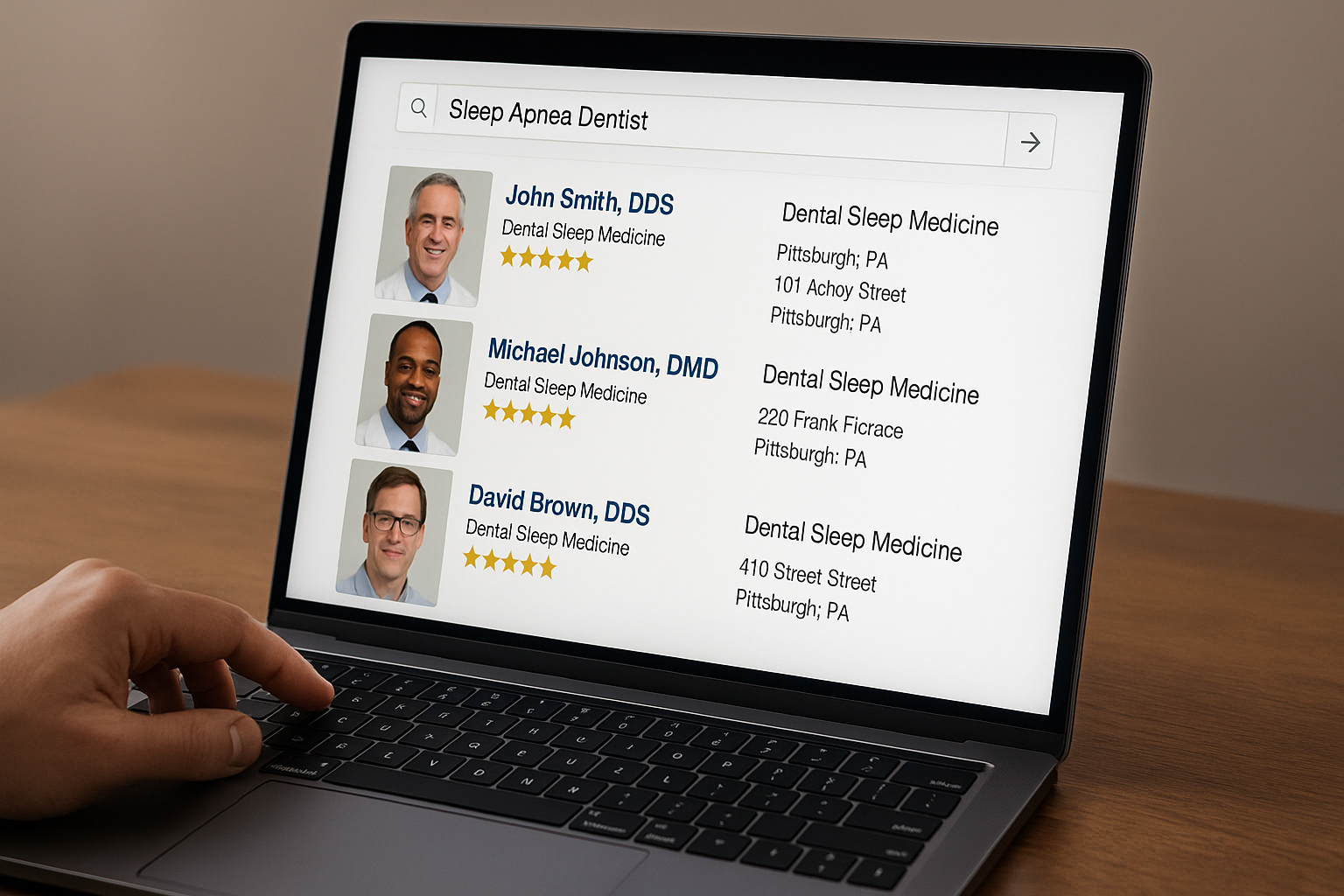How to Choose a Sleep Apnea Dentist That’s Right for Me
How to Choose a Sleep Apnea Dentist That’s Right for Me

Finding the right dentist can be challenging, but if you’re struggling with sleep apnea, the decision is even more important. A sleep apnea dentist, also known as a dental sleep medicine provider, specializes in treating sleep-related breathing disorders through oral appliance therapy (OAT) and other non-surgical solutions. These experts often work alongside physicians and sleep specialists to improve not only your rest but also your long-term health.
The right sleep apnea dentist can help reduce snoring, improve oxygen flow at night, and decrease the risks that come with untreated sleep apnea—such as high blood pressure, diabetes, and heart disease. But how do you know which provider is the best fit for you?
This guide walks you through the types of sleep apnea dentists, what qualifications to look for, and how to find a provider who matches your needs.
What Makes a Sleep Apnea Dentist Different?
While general dentists focus on oral health, a sleep apnea dentist has advanced training in dental sleep medicine. Their expertise lies in designing, fitting, and adjusting oral appliances that reposition the jaw and tongue to keep your airway open while you sleep .
Unlike CPAP machines, oral appliances are small, custom-made devices that fit like a mouthguard or retainer. A sleep apnea dentist understands the nuances of fitting these devices comfortably while ensuring they effectively treat your condition.
Factors to Consider When Choosing a Sleep Apnea Dentist
1. Credentials and Training
Look for dentists who are members of the American Academy of Dental Sleep Medicine (AADSM) or who have advanced certifications in sleep medicine . These memberships show a commitment to evidence-based care and continuing education. All PDSM providers have achieved the highest level of training and qualification exam to be Diplomates of the American Board of Dental Sleep Medicine, a credential that is above and beyond a AADSM Qualified Dentist level.
2. Experience with Sleep Apnea
Ask how many patients they’ve treated with oral appliances. An experienced dentist can offer a wider variety of solutions and troubleshoot common issues, like jaw soreness or device adjustments.
3. Collaboration with Sleep Physicians
The best sleep apnea dentists don’t work in isolation. They collaborate with sleep physicians and use sleep studies to ensure your treatment is effective. This team-based approach leads to better outcomes.
4. Insurance and Payment Options
Because oral appliances are billed as medical devices (not dental) and are only covered by Medical Insurance, you’ll want a dentist familiar with medical insurance and flexible payment plans. Confirm that they can help you navigate coverage for your treatment. It’s important to note that seeing an "In Network Provider" will always reduce the patients out of pocket cost the most. Pittsburgh Dental Sleep Medicine offices are In Network Providers with nearly all medical insurance policies.
5. Follow-Up Care and Adjustments
eSleep apnea treatment doesn’t end with receiving your oral appliance. The right dentist schedules follow-ups to fine-tune the fit, monitor your progress, and make adjustments as your needs change.
The ABDSM also has a Search for Provider tool on their website that only has Diplomates. Searching here by Zip Code will show even less choices to patients at the Diplomate level and we will appear over others that are just qualified dentists. www.abdsm.org
Where to Find a Qualified Sleep Apnea Dentist
You don’t have to search blindly—there are trusted directories and resources to guide your choice:
- AADSM Provider Directory – Search for certified dentists in your area who specialize in sleep apnea treatment .
- American Academy of Sleep Medicine (AASM) – Offers resources for patients, including information on collaborative care between physicians and dentists.
- Referrals from Your Sleep Specialist – If you already have a sleep study or CPAP prescription, ask your physician for recommendations.
- Patient Review Platforms – Sites like Healthgrades and Zocdoc can help you compare patient experiences, office details, and provider backgrounds.
Questions to Ask Before Choosing Your Dentist
When you schedule a consultation, come prepared with questions like:
- What is your experience treating patients with oral appliance therapy?
- How do you determine whether an oral appliance is right for me versus CPAP?
- Do you collaborate with sleep physicians or require a sleep study first?
- How often will we meet for adjustments and follow-ups?
- How does your office handle insurance billing for oral appliances?
- Where have you completed extra training , and how many hours, to treat OSA patient with OAT.
These questions ensure you’re not only choosing a qualified dentist but also someone who communicates clearly and prioritizes your comfort.
Why the Right Sleep Apnea Dentist Matters
Untreated sleep apnea doesn’t just cause poor sleep—it increases risks of stroke, heart disease, Type 2 diabetes, and even accidents caused by daytime fatigue . A well-trained sleep apnea dentist can change the course of your health by offering effective, comfortable alternatives to CPAP.
Patients often report improved energy, better focus, and even improved relationships after successful treatment. Choosing the right dentist isn’t just about sleep—it’s about reclaiming your quality of life.
Conclusion
Choosing a sleep apnea dentist is one of the most important steps you can take toward improving your health and well-being. By focusing on credentials, experience, collaboration with medical providers, and patient-centered care, you’ll find a provider who can deliver lasting results.
Whether you’re frustrated with CPAP or just starting to explore treatment options, the right sleep apnea dentist can help you breathe easier, sleep better, and live healthier.


